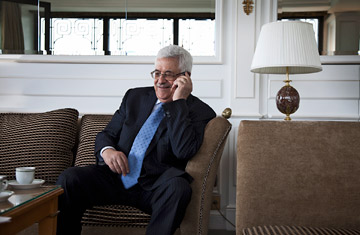
(5 of 6)
Abu Mazen can empathize with the urge to pick up arms in the face of frustration and an enemy. "It was in myself when I was young," he says. Born in Safed, a city in the Galilee region of present-day Israel, he was 13 when his family fled Jewish forces in 1948, along with 700,000 other Arabs. The family ended up in Damascus, where he laid pavement for two years, then taught primary school part of the day while attending high school. The young Abbas then studied law in Egypt and was working in Qatar as personnel director of the Education Ministry when he joined the party Yasser Arafat and a few others had formed to confront Israel.
"I decided to join Fatah and be active because at that time, the 1960s, nobody cares about us, nobody talks about us," Abbas says. "How can we draw the attention of the public opinion around us to know that there is a problem that needs to be solved? So we found this the only way, military action, revolution."
The plane hijackings, bombings and assassinations that followed in the late 1960s and '70s would do much to define modern political terrorism, calculated to draw attention that could then be transformed into political power. "About two-thirds of the countries in the United Nations started that way," says Ilan Halevi, a Jewish member of the PLO living during that period in Israel, which before independence had its own militants, even terrorists. "And because we took up arms, we were in a position to put them down with credibility." Abbas was among the first to say so, calling in 1977 for talks with moderate Israelis. By then he understood not only the limits of violence but also of Palestinians' knowledge about their enemy.
"So we are in a conflict, in a war, with somebody we don't know exactly what he is," says Abbas. "Is he an animal? Is he huge? Is he a giant? I don't know. So I started reading." What he came to eventually understand--after flirting with Holocaust denial in his Ph.D. thesis, a flirtation he later passionately disavowed--was that Israelis' strength flowed from desperation: "They don't have any other place to go." He also concluded that Israelis are extremely well armed, resourceful and allied with the most powerful nation in the world. "How can we deal with them?" Abbas asks. "War? It's impossible. Israel is a superpower."
For all the despair on the West Bank--at the political stasis, the growing settlements and the economic challenges many Palestinians face--Abbas' core belief is now something of an orthodoxy. As Salah Yasin, who sells plaster ceiling fixtures in Ramallah, puts it, "The military option is not possible." The majority of ordinary Palestinians agree with what pollsters call "the Abu Mazen approach."
Abu Mazen himself spends more and more time abroad, flying on a chartered jet provided by the United Arab Emirates, a statesman without a state, relentlessly grooming an image of a peaceful people denied a homeland in foreign capitals. People "mistake mildness for weakness, and they're different things," says Hussein J. Agha, a longtime PLO activist now at Oxford. "Unlike his image, he's very, very decisive. His predecessor had a different image, but he was much more reluctant to make a decision and stick with it."
